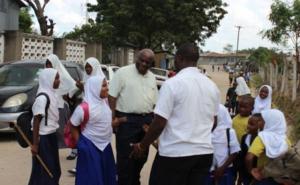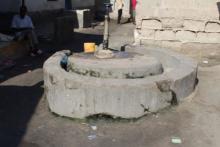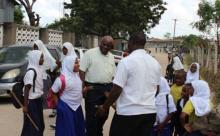Cholera outbreak threatens four regions in Tanzania
Dar es Salaam, 4 September 2015 – An on-going large-scale cholera outbreak has left thirteen people dead and affected 815 people in Dar es Salaam, Morogoro, Pwani and Iringa regions in Tanzania. WHO has ramped up its emergency response to support Tanzania's Ministry of Health and Social Welfare (MOHSW) to prevent more cases and treat people who have contracted the water-borne disease. But additional resources are urgently needed to contain further spread of the disease.
From 15 August to 3 September 2015, a total of 815 cases and 13 deaths were reported in Dar es Salaam, Morogoro, Pwani and Iringa regions. As of 3 September 2015, Dar es Salaam’s Kinondoni municipality recorded 471 cases, making it the worst affected district.
“To contain the outbreak we must identify all cases and quickly treat them, but the main focus needs to be preventing the spread of this highly-contagious disease. Within four weeks, we have seen a dramatic increase in the number of cases. Intensified actions and resources are needed to put a stop to this outbreak,” says Dr Rufaro R. Chatora, WHO Representative for Tanzania.
Following a rapid needs assessment of the affected areas, WHO has procured laboratory reagents, medical supplies, equipment and water treatment chemicals to contain the outbreak. Additionally, WHO has provided funds, Tanzania Shillings TShs 174 000 000, to support case management, laboratory services, surveillance and social mobilization activities.
The overall cost of WHO support is worth a total of US$ 102 347 equivalent to Tanzania Shillings TShs 216 260 000. WHO has supported the MOHSW to strengthen surveillance, reinforce laboratory capacities and train nearly 60 health care providers on cholera case management.
Dr Chatora says the WHO-led response has greatly contributed to reducing the number of cholera cases but the crisis is far from over. Significant challenges remain including the need to improve water, sanitation and hygiene (WASH) conditions as well as improve stocks of medicines, disinfectants and supplies for case management, contact tracing and social mobilization.
To address these urgent challenges, WHO has convened partners in efforts to mobilise support and funds that are needed to protect vulnerable groups that are living in communities where there is limited water and sanitation facilities.
Cholera, a waterborne disease, affects people who drink water or eat food contaminated with the bacterium Vibrio cholerae, causing severe diarrhea and dehydration. If untreated, especially in the very young and elderly populations, cholera can rapidly lead to shock and death.
____________________________________________________
For further information and interview requests, please contact:
WHO Country Office, United Republic of Tanzania
Dr Rufaro Chatora; Tel: +255 22 2113005; Email: chatorar [at] who.int (chatorar[at]who[dot]int)
Dr Grace Saguti; Tel: +255 754 287875; Email: sagutig [at] who.int (sagutig[at]who[dot]int)
Dr Neema Kileo; Tel: +255 755 551804; Email: kileon [at] who.int (kileon[at]who[dot]int)
WHO Regional Office for Africa
Dr Cory Couillard; Tel: + 472 413 9995; Email: couillardc [at] who.int (couillardc[at]who[dot]int)
WHO Headquarters, Geneva
Paul Garwood; Tel: +41 79 6037294; Email: garwoodp [at] who.int (garwoodp[at]who[dot]int)





